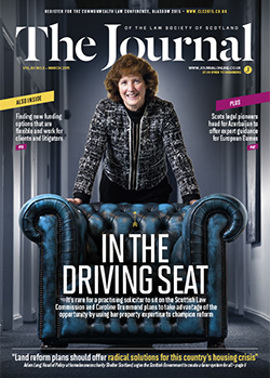Sizing up the class of 2018

In late 2014, the Society ran a survey of first-year LLB students. We hoped the findings would help us hone our careers advice. If we understand why people select law, we can tailor what we tell those who are looking to join the profession. If we understand what motivates the class of 2018, we can give the best possible support and advice over the next four years.
But this is simple, right? They pick law because they want to be lawyers. Well, kind of. Just over 40% of respondents said they had started the degree wanting to be a Scottish solicitor, with a further 11% wanting to be an advocate. Another 11% said they wanted to be a qualified lawyer somewhere else in the world – and we already know that a decent proportion return home after coming to Scotland for their LLB.
Nearly a quarter (23%) said they didn’t know what they wanted to do when they began the degree, while another 12% wanted to do something else entirely – either return to a career (e.g. the police) or use their LLB to go straight into another career. Simply put, that’s over one-third starting the Scots law LLB without the explicit intention of becoming a lawyer, and only just over half wanting to practise in Scotland.
As might be expected, three months in they are still idealists. We asked what areas of law they would most like to practise in. Four of the top five were what might reasonably be called “public interest” – criminal defence (5th), human rights (4th), family law (3rd) and criminal prosecution (1st). Will that change through the degree course?
We also asked why they picked law. The most popular reasons weren’t financial or about future security. Rather, by some margin, LLB students pick law because they are interested in the subject matter or had a desire for intellectual stimulation.
And with concerns about access to the profession rightly paramount, what is the make-up of first-year LLB students? Like the junior profession, they are disproportionately female (69%). They are more ethnically diverse, and more likely to be gay or lesbian, than Scotland, and the profession, as a whole. Of those educated in Scotland, nearly 85% went to a state school – lower than the national average (95%) but higher than the profession (71%).
In the last couple of years we’ve seen more dual-qualifying LLB courses and the launch of an online LLB. That said, LLB students are still less global than the student population as a whole: around 84% are Scottish domiciled, compared with around 65% of all students (Universities Scotland, 2013 figures). Will that change as more students globally become aware of innovations from our universities?
It will be fascinating to track their ambitions over the next few years. As the job hunt looms in their mind, are they more likely to want to pursue corporate work? Will some who are unsure of their careers choose to become solicitors? Will some who are dead-set on becoming solicitors decide the law isn’t for them?
In this issue
- Structured settlements: worth a look?
- Unfairness defined
- Our digital afterlife
- Powers of attorney: full instructions?
- Writings redefined
- Reading for pleasure
- Opinion: Adam Lang
- Book reviews
- Profile
- President's column
- Roll up to register
- People on the move
- Tax plan's on track
- Lease of life
- No win, no fee: no problem?
- Ready to go to court?
- Taking on the expert
- Pensions: keep up with the shake-up
- Equity investment and law firm funding
- Entitled to rely
- See-through setups
- Copyright: defining the boundaries
- Tenancies: the shape of things to come?
- A career taking off
- The system is sound, but...
- Law reform roundup
- Obituary: Leslie Cumming
- From the Brussels office
- From the Clyde to the Caspian
- Some common misconceptions
- Ask Ash
- Mediation: new options
- ABS: time to accept the evidence
- It is OK to change your mind
- Sizing up the class of 2018






